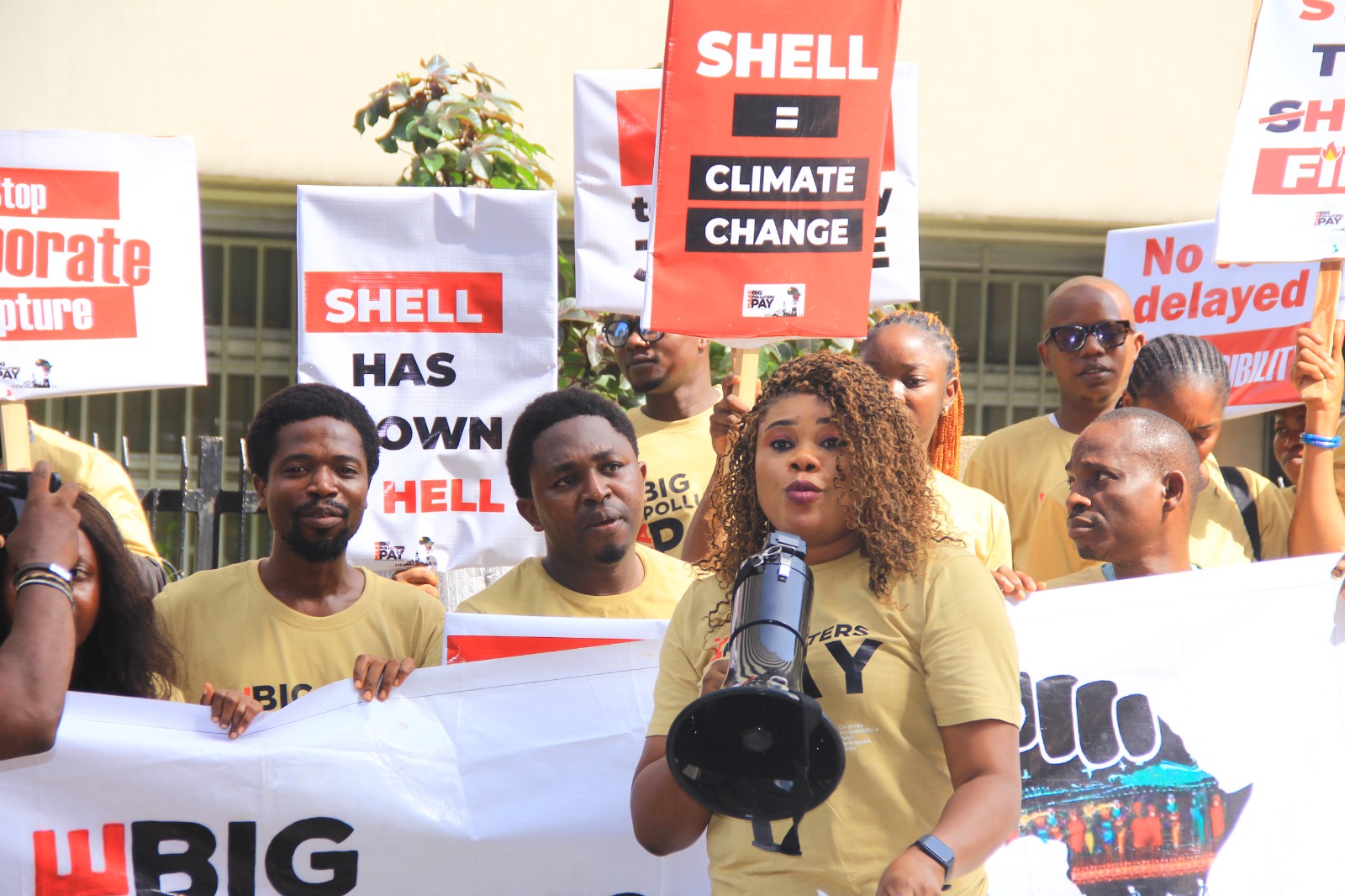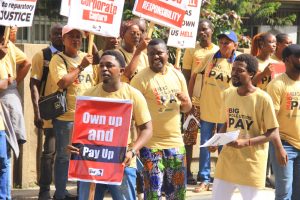
The Civil society organisations have protested at the head office of Shell Petroleum Development Company (SPDC) in Lagos State over its exit plan from Nigeria without restorng the environmental damage it created.
Environmental activists and other interested Nigerians who joined the protest in Lagis on Tuesday, denounced the plan by Shell to sell off its Nigerian operations to a local company that may not have the capacity to inherit its liability after crippling livelihoods of local communities in the Niger Delta.
 Activists Comrade Zikora Ibeh of ÇAPPÀ and Comrade Ogunlade Olamide Martins among others spoke at the protest ground, insisting that Shell must be held accountable for it’s environmental attrocities.
Activists Comrade Zikora Ibeh of ÇAPPÀ and Comrade Ogunlade Olamide Martins among others spoke at the protest ground, insisting that Shell must be held accountable for it’s environmental attrocities.
The protesters carried placards with some inscriptions such as “Shell has shown us hell” “Yes to reparatory justice” “No to delayed responsibility” “Stop the Shell fire”” ”Own up and pay up” ‘No clean up, no divestment” , ”Stop corporate capture” among others.
A joint Statement issued by Corporate Accountability and Public Participation Africa (CAPPA) and Health of Mother Earth Foundation (HOMEF) at the Make Big Polluters Pay Action on Shell Annual Shareholders Meeting currently ongoing at InterContinental London – The O2, 1 Waterview Drive, Greenwich Peninsula, London, United Kingdom, and as part of the Global Anti Chevron Day of Action.
While the entire leadership of Shell, including its Chairman, Board Members, Directors, and Stakeholders, convenes today in the United Kingdom for its Annual General Meeting (AGM), we gather here in front of its Lagos Head Office in Nigeria to re-state our longstanding grievances.
“Indeed, Shell’s shareholders would rather choose the comfort of the Intercontinental London Hotel to review their deceitful and environmental devastation strategies without any regard for the dignity and sanity of people who are at the receiving end of their hazardous operations.
“They would rather the cozy ambience of artificial nature than care about the growing impact and problems their reckless oil extraction inflicts upon vulnerable communities in Africa and elsewhere.
“In Nigeria, the absurdity reaches new heights as Shell sets to divest its onshore business and offload its toxic assets to Renaissance – a consortium of five companies, including four local exploration and production entities and an international energy group.
“This polluting corporation, after decades of mindless operations in the country’s Niger Delta region, is about to flee from its atrocities, leaving behind a wake of destruction – of farmlands and water bodies now contaminated with huge deposits of petroleum and of poor communities, livelihoods, and public health wrecked by years of its merciless extractive onslaught.
“To make matters worse, Shell’s plan to sell its onshore assets is a further act of mischief, especially considering that the new buyers are companies with shadowy backgrounds and limited capacity to manage the corporation’s extensive liabilities.
Additionally, Shell allegedly intends to provide a loan to these buyers to help them purchase the same assets.
This shameless ploy to offload liabilities while continuing to profit from the transaction reveals the depth of Shell’s exploitation and the lengths it will go to maintain its stranglehold on Nigeria’s resources while evading accountability.
It is in light of this that the Nigerian government must act responsibly, and in accordance with extant exit measures and processes to address lingering questions around the environmental audit of the corporation’s infractions, compensation plans for affected citizens of the Niger Delta whose lives have been irreversibly impacted by Shell’s extractivism, and the terms and conditions of this divestment.
This includes forcing Shell to decommission its old and toxic infrastructures scattered across the region.
We are aware that this AGM presents yet another opportunity for Shell’s managers to boast about its profits and declare its growth projections.
They will undoubtedly tout their targets to become a net-zero emissions energy business destination by 2050, with the claim that this will contribute significantly to meeting the ambitious goal of the Paris Agreement aimed at limiting the rise in the global average temperature to 1.5°C above pre-industrial levels.
Yet, science has consistently debunked these hollow promises. Shell’s so-called energy transition plan is just a corporate strategy designed to delay meaningful action and deny justice to those who suffer the most from its operations.
And it is for this reason that we are standing here today and again to remind the group’s global leadership of its obligations to Nigerians, especially vulnerable communities and people of the Niger Delta. Shell’s divestment from Nigeria does not absolve it of responsibility.
The company must address the environmental destruction, human rights abuses, and social injustices it perpetrated. Before its departure, Shell must commit to implementing the reclamation measures recommended by independent environmental audits and pay adequate compensation to those who have borne the brunt of its profit-driven operations. In this list of oil majors hurting innocent Nigerians, Shell is not alone.
A 2023 report commissioned by the Bayelsa State government reveals that over the past fifty years, ninety per cent of the toxic pollution in the Niger Delta – equivalent to at least 110,000 barrels of oil – originated from the facilities of just five international oil giants: Shell, Chevron, Eni, Total, and ExxonMobil. Despite this, Chevron is scaling up investments in the country amid the environmental crises in communities caused by its operations.
We demand that the Nigerian government and governments worldwide prioritise human and environmental dignity over corporate profits. Nowhere is the failure of governance and corporate exploitation more apparent than in the Niger Delta. In this region, the connection between natural resource exploitation and abject poverty is palpable and undeniable.
If entities like Shell and Chevron are not held accountable and forced to pay up for their sins, poor communities will continue to suffer the devastating consequences of their operations without succour.
Our call today is for justice.
“We demand that governments stand with the people, not the profiteers. We call for the enforcement of policies that protect the common good and political will from the government to hold big polluters accountable. The time for action is now!
“Since 1950, Shell has dominated the Nigerian extractive industry, and its operations have had severe consequences, including climate change, regulatory infractions, and environmental injustice.
“Shell and Chevron’s inhumane operations in Nigeria and beyond have caused both economic and non-economic losses, hence the strong resistance against them, as seen in the number of lawsuits filed against them for environmental damages and human rights abuses.
“Shell, in a series of attempts to escape liability and social scrutiny, continues to hire image makers and negotiators to silence the just agitations of the people of the Niger Delta, as evidently seen in the destruction of Ogoni land in Rivers State.
Further demands by the groups including:
“To return dignity back to the people stripped of it, we call for the following:
An independent and comprehensive assessment of the environment of the entire Niger Delta.
“An open and comprehensive health audit of the people living in extractive communities across the Niger Delta.
“A cleanup, remediation, and restoration of all polluted and contaminated areas linked to Shell’s extractivism.
“That Shell and Chevron be held accountable for the destruction of communities in the Niger Delta.
“That divestment and/or expansion plans follow due process of decommissioning.
“That the Nigerian Government’s environmental and climate change policies be weaned off unfounded corporate language, including false solutions such as Net Zero.
“That communities are recognised as major stakeholders that must be afforded expression on matters that concern their safety and survival.











